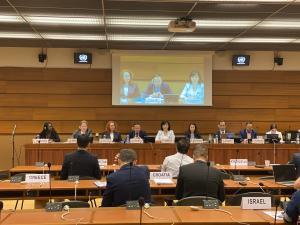As one of the United Nations regional economic commissions, UNECE has a key role to play in helping countries with economies in transition to better integrate into the global economy. UNECE is at the forefront of setting international standards on cross-border procedures, identifying regulatory and procedural barriers to trade and delivering related capacity building and technical assistance to meet specific country needs.
At the recent 8th session of the UNECE Steering Committee on Trade Capacity and Standards, government delegates, experts from international organizations, including other UN agencies, as well as private sector and academia discussed progress on trade-development in the UNECE region. The Committee also explored the trade-related emerging new topics, such as the digital and green transformations, that UNECE member States had already identified as cross-cutting priority topics for the organization.
The high-level segment took stock of the lessons learned from UNECE Studies on Regulatory and Procedural Barriers to Trade (RPBTs), carried out for more than ten countries, over the past 11 years. Delegations endorsed recommendations for future studies to become more focused on specific country needs and to better measure their contribution to the United Nations’ Sustainable Development Goals. The participants also agreed on the secretariat’s suggestion to change the methodology of the RPBTs so that future studies can effectively assess obstacles in the transition towards green, circular and digital economies.
The committee session also featured discussions on regulatory and procedural barriers to trade in specific national contexts. The preliminary findings of a study on Kyrgyzstan led to concrete recommendations on how to leverage opportunities to further enhance export capacities in the field of agriculture, a key export sector of this land-locked country in Central Asia. A study on the Republic of Moldova took stock of the progress the country made in the implementation of its commitments under the World Trade Organization Agreement on Trade Facilitation (WTO TFA) and identified potential areas for donor support that might be needed to undertake capacity building.
The Committee is carrying out this work in close cooperation with other United Nations bodies, international organizations and development partners, such as the Organisation for Economic Co-operation and Development (OECD), World Trade Organization (WTO), United Nations Conference on Trade and Development (UNCTAD), United Nations Forum on Sustainability Standards (UNFSS) and the Advisory Centre on WTO Law (ACWL), which brought their perspectives to the discussion. To maximize synergies within UNECE’s normative instruments, the Committee was also briefed about relevant progress achieved by UNECE inter-governmental bodies, notably the Committee on Innovation, Competitiveness and Public Private Partnerships (CICPPP), the United Nations Center for Trade Facilitation and Electronic business (UN/CEFACT), the Team of Specialists on Environmental, Social and Governance Traceability of Sustainable Value Chains in the Circular Economy ToS ESG VC CE), as well as relevant networks, notably, the UNECE Circular STEP Network and the UN-ECE Transformative Innovation Network (ETIN).
The work of the UNECE Committee is guided by a Bureau, with the three leading positions elected by UNECE member States for a three-year term. The newly elected Chair of the Committee, Mr. Zdenko Lucić, State Secretary at the Ministry of Foreign and European Affairs of Croatia, set the course for the next year and the work going forward.
“It is a great honour and privilege to be elected chair of the SCTCS. UNECE will play an important role in trade policy making and I will use my experience and knowledge in trade related areas to help advance new agendas. I look forward to our future work with UNECE”, said Mr. Lucić.
Mr. Nurbek Maksutov, of Kyrgyzstan and Mr. Ilyas Akhmetov of Kazakhstan were elected as vice-chairs, reflecting the importance of Central Asian economies in the Committee’s work.
Note to editors
The Steering Committee on Trade Capacity and Standards is an inter-governmental body of the UNECE. It oversees and guides the development of international norms and standards, procedures and best practices for reducing transaction costs associated with export and import processes and increasing the efficiency, predictability and transparency of trade regulations and procedures.


